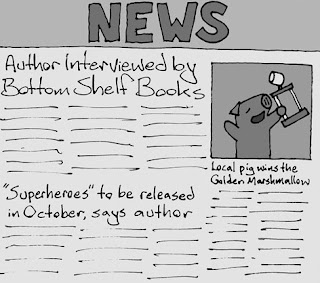
Author: Alec Sillifant
Illustrator: Mike Spoor
After decades of silence, Sillifant finally takes it upon himself to pick up the torch and continue the story that began with George Orwell's Animal Farm. When we left the Animal Farm last, it was under the corrupt rule of Napoleon the pig's Stalin-esque regime. The pigs in power had begun to wear clothes and had become virtually indistinguishable from their authoritarian human counterparts. Having departed from their socialist roots, the farms adopts the philosophy of "All animals are equal, but some animals are more equal than others."
Farmer Ham is a direct descendent of Napoleon the Pig. Having inherited the farm from his lineage of revolutionary ancestors, he now rules his domain with an iron fist and is known for his ruthless tactics. Indeed, an underground newspaper gave him the name Farmer Ham because of his willingness to brutally eliminate any opposition, even cannibalistically disposing of those within his closest inner circle. Ironically, he liked the name and (after destroying the newspaper and imprisoning its employees), he proudly adopted it as his own and referred to himself as Farmer Ham from that day forward. It was the perfect name... the kind of perverse moniker that inspires the fear necessary to maintain order and give revolutionaries reason to pause.
The original Animal Farm was a thinly veiled story about the Soviet Union that warned against the dangers of totalitarian government and the inevitable cycle of corruption that comes hand in hand with power. ("When it comes to revolutionaries, trust only the sad ones. The enthusiastic ones are the oppressors of tommorrow." -William Vollman) This newest installment reminds us that no power is absolute--that there will always be challengers to the throne and that power is a luxury that must be maintained with meticulous precision. To illustrate this point, Sillifant presents Farmer Ham's totalitarian regime with a familiar nuisance: anarchists.
Represented by a gaggle of unruly crows, Farmer Ham's government is challenged by a band of rowdy nihilists who refuse to bow down to his authority. This dangerous here is obvious, as a few successful rebels can infect an otherwise submissive populace, and the next thing you know, you have a revolution on your hands. Farmer Ham knows that he must act quickly and decisively to quell the uprising. To do so, he recruits and trains an elite force of brutes known as the Scarecrow, a shadowy arm of law enforcement that has imperial permission to use whatever tactics they deem necessary. With the terrifying Scarecrow patrolling the fields, the dangerous anarchist element is quickly scattered to the winds.
So Farmer Ham's reign of terror lives another day... but how long can he maintain his stranglehold on the farm before he is toppled from his lofty perch? Today it's anarchist crows, tomorrow it may be socialist moles sprouting up from the ground, or capitalist pigs preaching their free market mumbo jumbo... no, it is only a matter of time before someone rises up against the oppressive Farmer Ham and decides that it's time to bring home the bacon.
And on his farm he had a coup, ee ii, ee ii, oooooooooo...



 Kermit: Perhaps the most famous frog in history, Kermit was the ultimate explorer, blazing trails and opening doors at a prolific clip. He first burst onto the scene as the first frog in space ("One small hop for frogs, one giant leap for frogkind.").
Kermit: Perhaps the most famous frog in history, Kermit was the ultimate explorer, blazing trails and opening doors at a prolific clip. He first burst onto the scene as the first frog in space ("One small hop for frogs, one giant leap for frogkind.").






























